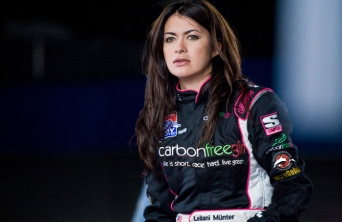Leilani Munter Joins The Intervention
Leilani Munter isn’t afraid to call herself a “tree hugger.”
Although she might be known as a racecar driver that has raced for the Indy Pro Series, ARCA Series, NASCAR and more, Munter is quick to refer to her real passion in life: environmentalism.
Racing and green living may not seem to go hand-in-hand, however Munter has created a balance between the two and she’s intent on changing the way eco-friendly behavior is perceived in the public sphere.
To further promote her commitment against nonrenewable energy, Munter talked to us about her eco-strategy, the benefits of meatless Mondays, and how an online post turned a NASCAR forum into a debate about climate change.
CS: Why did you join the intervention against non-renewable energy?
I think the writing is on the wall, and has been for quite some time now, that we must get off of fossil fuels and move towards renewable forms of energy. The way we have been living, using up so many of our natural resources and polluting our land and oceans, is clearly not sustainable. Charles Darwin once said, “It is not the strongest of the species that survives, nor the most intelligent that survives. It is the one that is the most adaptable to change.” And so the time has come for us to adapt, to change, and to improvise the way that we are living. And I believe that this generation has been called upon to answer to the most noble of duties, which is to ensure the survival of future generations with the most basic of survival mechanisms - adaptation.
CS: How did you get inspired to become an environmentalist?
I grew up in the outdoors riding horses in the woods of Minnesota. For as long as I can remember, I have felt close to nature and been an animal lover. In college, I volunteered for three years at a wildlife rescue and rehabilitation center.
In 2006, when I realized that I had a voice to speak to a larger audience through my racing, I took my personal concerns public when I added a section on my website dedicated to environmental news. In 2007, I announced my commitment to adopt and protect an acre of rainforest for every race I run to offset my carbon footprint. Offsetting is not a solution, but I had to do something about my unavoidable emissions.
I was told by many people in the racing world that I was making a big mistake. That as a racecar driver I need to shut up, drive the car and plug my sponsors. Marketing people warned me that by talking about political and environmental issues I would alienate myself from companies that might want to sponsor my racecar. Companies that may have CEOs that don’t believe in climate change. But I had made a very important decision and that was to talk about what I believed in even if it landed me on the sidelines at the race track.
CS: How do you integrate green living into your racecar driving lifestyle?
Like I said earlier, I cannot separate my racing from my environmentalism because it is the racing that gives me my voice to speak about these issues. There have definitely been struggles, I have walked away from sponsors that could have taken my racing career to the next level but did not align with my environmental beliefs. I want to feel good about the companies I am working with. I don’t work with any fossil fuel-based companies - oil, coal - and I don’t work with any companies that use meat products, do animal testing, or use fur or leather. So I may not drive very often (last year I only raised enough sponsorship to run two races) but I do feel good about the companies I am promoting. That’s the choice I have made. I just hope that my patience will pay off and, eventually, I will get the corporate support from good companies that are working hard to be environmentally responsible and also from those that see the value in reaching out to spread environmental awareness to the 100 million race fans in the USA. Don’t forget that auto racing is the number one spectator sport in America.
CS: What do you do to 'live your cause'?
In the same, typical ways most tree-hugging racecar drivers do.
To address the carbon footprint of the fuel burned when I drive my racecar, I adopt an acre of rainforest every time I drive and I have been doing that since 2007. I promote green companies on my racecar. I debuted at Daytona last year in a racecar sponsored by six eco companies - solar, wind, LED lighting, etc. My most recent sponsor was Operation Free, a group of veterans fighting for clean energy in DC and educating Americans that our $1 billion per day habit on foreign oil is a national security threat.
Outside of my career, I have been a vegetarian almost my entire life. I use solar and LED lighting. I compost, recycle, collect rainwater, have a vegetable garden in the summer, and support local renewable energy programs. I am hoping to get some solar panels up on my roof this year but as you know, that can be somewhat pricey so it’s the finances that have postponed that move. When possible, I like to be personally involved in the activism. Last year I made a couple of trips to the Gulf Coast oil disaster and documented the devastation there through video, photographs, and my blog on my site as well as on Huffington Post’s Green section.
CS: Do you have an example of how you get your message to your fans?
I remember one example in particular from several years ago. I came across an argument that had started on a NASCAR forum. One member of the forum was very annoyed that I was promoting the movie “An Inconvenient Truth” on my website. He called me all kinds of names and said that I was brainwashed by Al Gore. Others chimed in to agree. Another member of the forum asked him if he had ever seen the movie and questioned how he could judge the movie if he hadn’t seen it. The thread became very long and people were arguing back and forth - some liked me, some hated me - but both sides were posting with passion. And when I got past the personal attacks on myself, I sat back and thought, “Wow, I just started an argument about CLIMATE CHANGE on a NASCAR forum!” I guarantee you this was the first time people in that racing forum had argued about the PPM of CO2 in our atmosphere. I had started a dialogue - and that is the first step in creating change - to start a dialogue between the two sides. And that very simple thing became something very important to me and since that day, it has come to define my career.
CS: What is one fact that could change the world if everyone knew it?
Well, how about the fact that there are 7 billion people on the planet and we are growing at a rate of around 250,000 people every day. Many of these people are living in chaos, poverty, hunger, and have little or no education. They struggle for the basic needs of life—food, water, clothing, and shelter. Most of them don’t have the ability to improve their lives for themselves or their children and many, if they aren’t already, are going to be struggling for clean water.
According to the World Heath Organization and NASA, water shortages are currently affecting 400 million people and by 2050 will affect 4 billion people -- just shy of half of the 9 billion that the UN estimates will be our total population at that time. Imagine 9 billion people needing food, water, and shelter. And can you imagine how much waste 9 billion people would create? With the increased need for space, where will we put all that garbage? If we are fighting with each other now, what is going to happen when we start fighting each other for something as basic a human need as fresh water?
CS: What is one everyday thing that everyone can do to make a difference?
Giving up meat, or cutting back on meat (committing to Meatless Mondays!) is one of the single most important actions a person can take to reduce their impact on the environment. Grazing animals produce methane, which is 21 times more heat trapping than CO2. A UN study found that 40 percent more greenhouse gas emissions come from raising animals we eat than all the world's cars, SUVs, planes, trains, ships and all other forms of transportation. A meat diet requires many more natural resources than a vegetarian diet. One acre of land can produce 165 pounds of beef or 20,000 pounds of potatoes. There are so many benefits, not only for the environment, but for animal cruelty, world hunger, and health.
And if you don’t want to listen to it coming from me, how about listening to Albert Einstein who said, “Nothing will benefit human health and increase the chances for survival of life on Earth as much as the evolution to a vegetarian diet.”







